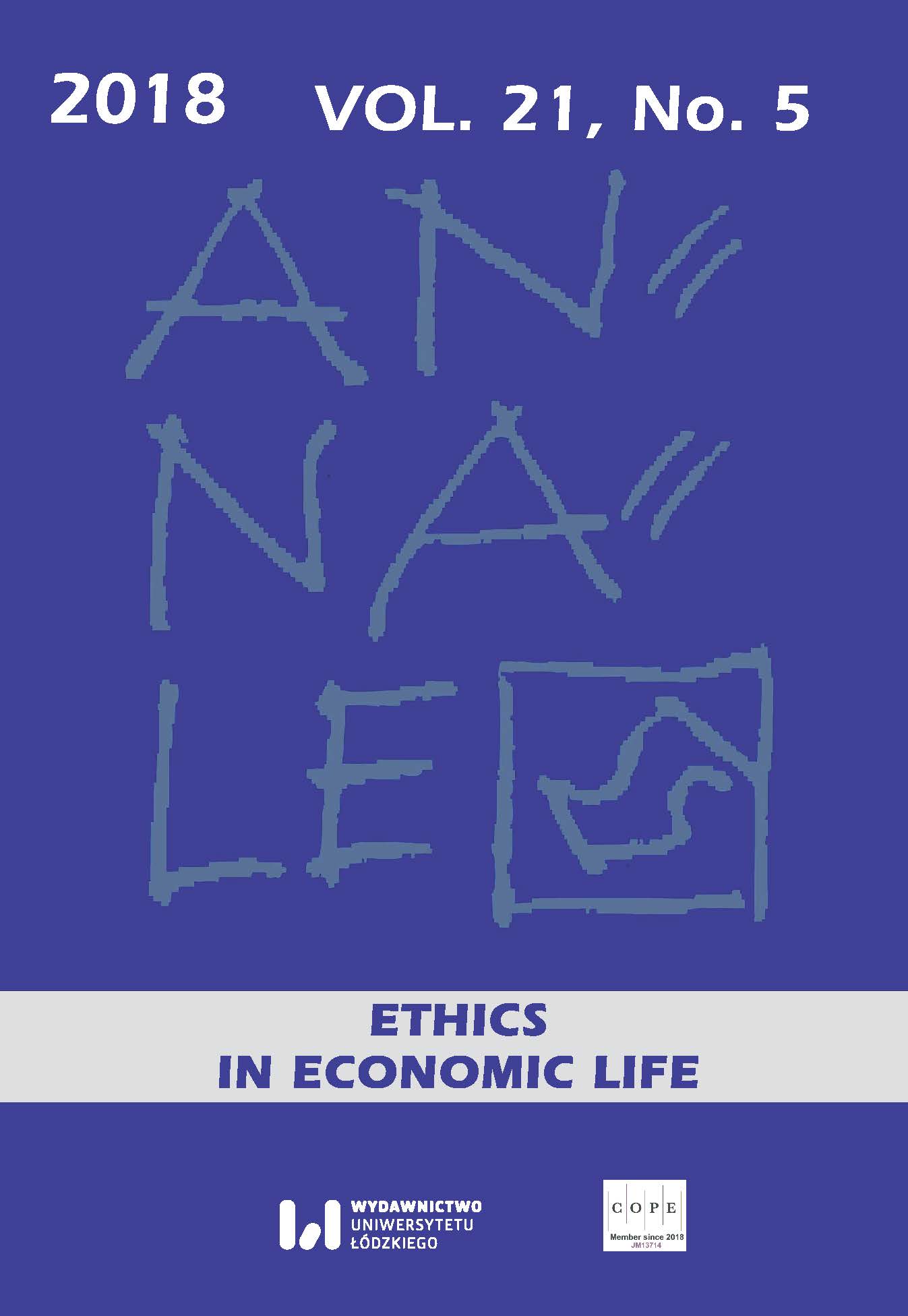The importance of “disclosure” in relationships between physicians and pharmaceutical companies
DOI:
https://doi.org/10.18778/1899-2226.21.5.07Słowa kluczowe:
conflict of interest, disclosure, ethical standard, pharmaceutical industryAbstrakt
The article raises issues of transparency in relationships between doctors and drug manufacturers. It indicates how important it is as a way for physicians and the pharmaceutical industry to regain public trust. The manuscript will define the concept of disclosure. It will discuss in detail The Physician Payment Sunshine Act from the U.S., which imposes a legal obligation on pharmaceutical companies to disclose their relationships with doctors and university hospitals. The article will also show the diverse regulation of disclosure in different countries of the European Union. The situation in Poland will be also described. In the summary, there will be a discussion about the importance of disclosure for patients and the advantages and disadvantages of such regulations for physicians and drug manufacturers.
Bibliografia
AdvaMed. (n.d.) The Physician Sunshine Act and you. http://advamed.org/res.download/60
Google Scholar
Agrawal, S., Brennan, N., & Budetti, P. (2013). The Sunshine Act—effects on physicians. New England Journal of Medicine, 368(22), 2054–2057.
Google Scholar
American Medical Association. (n.d.). Sunshine Act FAQs. http://www.amaassn.org/ama/pub/advocacy/topics/sunshine-act-and-physician-financialtransparency-reports/sunshine-act-faqs.page?
Google Scholar
Belluz, J. (2014, September 30). Doctors and hospitals got at least $3.5 billion from industry in just five months. Vox. http://www.vox.com/2014/9/30/6868897/you-can-now-search-for-your-doctors-pharma-payments-online-sunshine-act
Google Scholar
Campbell, E. C., Gruen, R. L., Mountford, J., Miller, L. G., Cleary, P. D., & Blumenthal, D., (2007). A National Survey of Physician – Industry Relationships. The New England Journal of Medicine, 356, 1742–1750.
Google Scholar
CBOS [Centre for Public Opinion Research]. (1999). Prestiż zawodów [Prestige of profession]. Warszawa: CBOS.
Google Scholar
CBOS [Centre for Public Opinion Research]. (2013). Prestiż zawodów [Prestige of profession]. Warszawa: CBOS.
Google Scholar
CBOS [Centre for Public Opinion Research]. 2016. Społeczne oceny uczciwości i rzetelności zawodowej [Social evaluation of honesty and professional integrity]. Warszawa: CBOS.
Google Scholar
Centers for Medicare & Medicaid Services. (n.d.) Fact Sheet for Physcians, https://www.cms.gov/Regulations-and-Guidance/Legislation/National-Physician-Payment-Transparency-Program/Downloads/Physician-fact-sheet .pdf
Google Scholar
Centers for Medicare & Medicaid Services. (n.d.) Open Payments Data Summary. https://openpaymentsdata.cms.gov/summary
Google Scholar
Ciadini, R. (2003). Wywieranie wpływu na ludzi. Teoria i praktyka. Gdańsk: Gdańskie Wydawnictwo Psychologiczne.
Google Scholar
The CMS Blog. (2016). CMS Releases Third Year of Open Payments Data. https://blog.cms.gov/2016/06/30/cms-releases-third-year-of-open-payments-data/
Google Scholar
Dhuri, S. (2013). Comparison of the French sunshine act. (Loi Bertrand Law) and the US Sunshine Act. https://pharmapromotional.wordpress.com/2013/09/30/comparison-of-the-french-sunshine-act-loi-bertrand-law-and-the-us-sunshine-act/
Google Scholar
Hajnosz, I., & Wróblewski, H. (2007). To jak pan korumpował lekarza. Gazeta Wyborcza, 182, p. 6.
Google Scholar
Halperin, E. C., Hutchison, P., & Barrier Jr, R. C. (2004). A population-based study of the prevalence and influence of gifts to radiation oncologists from pharmaceutical companies and medical equipment manufacturers. International Journal of Radiation Oncology • Biology • Physics, 59(5), 1477–1483.
Google Scholar
INFARMA. (2008). Kodeks Dobrych Praktyk Przemysłu Farmaceutycznego [Code of Good Practice of the Pharmaceutical Industry]. http://www.infarma. pl/assets/files/etyka/KodeksDobrych Praktyk_Wyd_2_201014_PL.PDF
Google Scholar
INFARMA. (2015). Kodeks przejrzystości [Transparency Code], http://www.kodeksprzejrzystosci.pl/assets/files/etyka/Kodeks_Przejrzystosci_wydanie_5.pdf
Google Scholar
INFARMA. (2015–2017). Raport przejrzystości. http://www.kodeksprzejrzystosci.pl/raporty/
Google Scholar
INFARMA. (2016). Czym jest Kodeks Przejrzystości. http://www.kodeksprzejrzystosci.pl/kodeks-przejrzysto%C5%9Bci/
Google Scholar
Kruczkowska, M. (2013). Koncerny farmaceutyczne korumpują Chiny. Jeden się pokajał. Gazeta Wyborcza, 172, 8.
Google Scholar
Lieb, K., & Scheurich, A. (2014). Contact between doctors and the pharmaceutical industry, their perceptions, and the effects on prescribing habits. PLoS One, 9(10). doi: 10.1371/journal.pone.0110130
Google Scholar
Lizut, M. (2006). Jak ustawić lekarza. Gazeta Wyborcza, 120, 4.
Google Scholar
Makowska, M. (2010). Etyczne standardy marketingu farmaceutycznego. Warszawa: CeDeWu.
Google Scholar
Makowska, M. (2012). Rola śledztw dziennikarskich w kreowaniu etycznych standardów marketingu farmaceutycznego. Prakseologia, 152, 125–144.
Google Scholar
Makowska, M. (2016). Etyczne wyzwania współpracy studentów medycyny z przemysłem farmaceutycznym. Studium porównawcze sytuacji w USA i Polsce. Warszawa: Wydawnictwo Szkoły Głównej Gospodarstwa Wiejskiego.
Google Scholar
Markowska, M., & Jasiński, Ł. (2017). Znaczenie „przejrzystości” w relacjach lekarzy z firmami farmaceutycznymi. Annales. Ethics in Economic Life, 20(1), 95–109.
Google Scholar
McDermott, Will & Emery. (2014). Snapshot of sunshine rules in EU countries for the pharmaceutical industry. http://documents.jdsupra.com/beee41ce-968c-484e-9eca-73d39615efb1.pdf
Google Scholar
Orlowski, J. P., & Wateska, L. (1992). The effects of pharmaceutical firm enticements on physician prescribing patterns. There’s no such thing as a free lunch. Chest, 102(1), 270–273.
Google Scholar
Pham-Kanter, G., Alexander, G. C., & Nair, K. (2012). Effect of physician payment disclosure laws on prescribing. Archives of Internal Medicine, 172(10), 819–821.
Google Scholar
PolicyMed. (2016). Open Payments Data Summary. http://www.policymed.com/2016/06/open-pay ments-2015-data-released.html
Google Scholar
Prozilo Life Sciences. (2015). Ready or Not, Full Speed Ahead for the Global Transparency Movement. https://s3-us-west-2.amazonaws.com/porzio/media/1432/porziols-white-paper_august-2015.pdf
Google Scholar
Rabij, M., (2014). Lekarz zdalnie sterowany. Newsweek Polska, 2, 32–35.
Google Scholar
Szymborski, T. (2003). Kasa fundacji zabytków. Rzeczpospolita, 123, A1–A4.
Google Scholar
Wazana, A. (2000). Physicians and the pharmaceutical industry. Is a gift ever just a gift? Journal of American Medical Association, 283(3), 373–380.
Google Scholar
Zverejňovanie na základe zákona č. 362/2011 Z. z. o liekoch a zdravotníckych pomôckach. http://www.nczisk.sk/Medicinska-statistika/Zverejnovanie_na_zaklade-zakona_362-2011_liekoch_zdravotnickych_pomockach/Stranky/default.aspx
Google Scholar
Pobrania
Opublikowane
Jak cytować
Numer
Dział
Licencja
Prawa autorskie (c) 2018 Annales. Etyka w Życiu Gospodarczym

Utwór dostępny jest na licencji Creative Commons Uznanie autorstwa – Użycie niekomercyjne – Bez utworów zależnych 4.0 Międzynarodowe.









